EU context
Trods den betydelige vækst i beskæftigelsesgraden for ældre arbejdstagere gennem det seneste årti i mange EU-lande fremhæver man i Europa-Kommissionens Fælles Rapport om Beskæftigelsen 2017 potentialet for at øge beskæftigelsesgraden yderligere. I 2016 lå beskæftigelsesgraden for ældre arbejdstagere mellem 55 og 64 år i EU på 55,3 % sammenlignet med 66,6 % for hele gruppen mellem 15 og 64 år. Stigningen har været størst blandt ældre kvinder.
Den europæiske søjle for sociale rettigheder skaber en ramme, der kan hjælpe arbejdsmarkederne med at tilpasse sig nye udfordringer og samtidig fremme retfærdighed og solidaritet mellem generationerne. Man understreger retten til et arbejdsmiljø, der er tilpasset arbejdstagerens faglige behov, for at give dem mulighed for at forlænge deres deltagelse på arbejdsmarkedet. Desuden forpligter man sig til i den seneste selvstændige aftale mellem arbejdsmarkedets parter i Europa om aktiv aldring og en metode på tværs af generationerne til at gøre det lettere for ældre arbejdstagere at deltage aktivt og forblive længere på arbejdsmarkedet.
Eurofounds arbejde
Eurofound har en lang tradition med ekspertise inden for de spørgsmål, som den aldrende arbejdsstyrke står over for. Forskningen siden 1990'erne har fokuseret på ældre arbejdstageres deltagelse på arbejdsmarkedet, jobresultater, arbejdsvilkår og præferencer på arbejdsmarkedet i den politiske sammenhæng med Europas ændrede demografiske profil. Arbejdet har også været centreret om politisk opbakning og initiativer på virksomhedsniveau, der kan fremme ældre arbejdstageres beskæftigelse. Man har set på ældre kvindelige arbejdstagere og fremhævet de stigende beskæftigelsesrater for denne gruppe og deres stigende andel af arbejdsstyrken, navnlig i aldersgruppen fra 55 til 64 år.
Undersøgelsesdata
Eurofounds store undersøgelser leverer en række data om situationen for ældre arbejdstagere. Den sjette europæiske undersøgelse af arbejdsvilkår (EWCS) ser på, hvordan ældre arbejdstagere er stillet på tværs af forskellige dimensioner af jobkvalitet. Selvom det er mindre sandsynligt, at ældre arbejdstagere bliver arbejdsløse end yngre, viser data, at ældre arbejdstagere føler, at hvis de bliver arbejdsløse, vil de ikke kunne finde et nyt job med en tilsvarende løn og vil have svært ved at komme tilbage på arbejdsmarkedet.
En undersøgelse baseret på Eurofounds femte europæiske undersøgelse af arbejdsvilkår (EWCS) kigger på kendetegnene ved den ældre arbejdsstyrke og på arbejde i forskellige aldre samt de faktorer, der gør arbejdet bæredygtigt for en aldrende arbejdsstyrke: gode arbejdsvilkår, fysisk og mental velvære og balance mellem arbejde og privatliv.
Eurofounds europæiske livskvalitetsundersøgelse (EQLS) indeholder aldersrelaterede resultater vedrørende forskellige dimensioner af livskvalitet i Europa. En analyse af præferencer på arbejdsmarkedet for personer over 50 år trækker på resultaterne af den tredje EQLS og viser, at mange ældre arbejdstagere foretrækker at arbejde færre timer selv under hensyntagen til deres økonomiske behov. Ved at lette denne tættere overensstemmelse mellem arbejdstid og folks præferencer kan man gøre det muligt at motivere dem til at arbejde længere.
Længere arbejdsliv
For nylig sluttede Eurofound sig til tre andre EU-agenturer og så på aldersvenligt arbejde i Europa, de politiske udfordringer vedrørende den aldrende arbejdsstyrke og innovative løsninger.
Mange er ikke i stand til eller kan ikke finde motivationen til at arbejde indtil den lovbestemte pensionsalder. Men der findes også en gruppe, der er i stand til og villige til at arbejde efter pensionsalderen. Eurofound har undersøgt det stadig mere fremherskende fænomen med at påtage sig arbejde efter pensionsalderen.
Ved den seneste forskning har man fokuseret på at forlænge arbejdslivet gennem fleksible pensionsordninger, idet man især har kigget på ordninger med delvis pension, der kan fremme dette. Revisioner midt i karrieren kan bidrage til længere arbejdsliv. Forskerne har undersøgt, hvordan man kan hjælpe med til at præcisere arbejdstagernes muligheder for at forblive på arbejdsmarkedet indtil en senere pensionsalder. Man fremhæver forskellige instrumenter, der er udviklet af virksomhederne for at holde fast på de aldrende arbejdstagere.
I andre forskningsprojekter dokumenterer man nationale og sektorbaserede initiativer fra regeringer og arbejdsmarkedets parter for at beholde ældre arbejdstagere på arbejdsmarkedet, herunder økonomiske incitamenter og forbedrede betingelser. I et tidligere projekt analyserede man initiativer til aldersforvaltning, der var indført før og efter recessionen, for at fremhæve god praksis på virksomheder i Europa.
Ressourcer
















